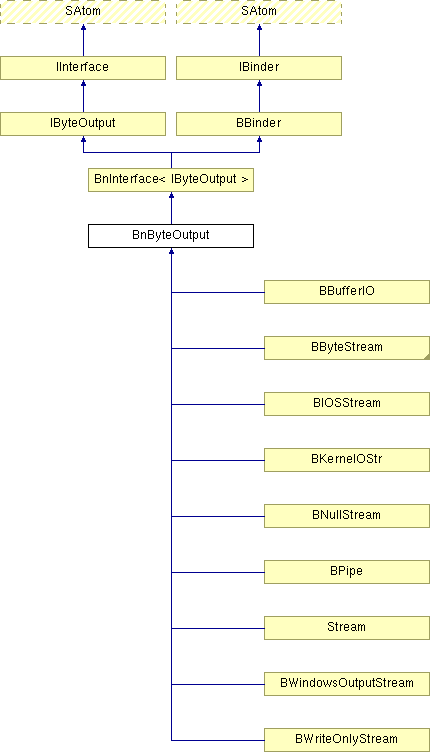
#include <support/ByteStream.h>
Inheritance diagram for BnByteOutput:

Public Member Functions | |
| virtual status_t | Effect (const SValue &in, const SValue &inBindings, const SValue &outBindings, SValue *out) |
| Perform an action on the binder. | |
| virtual status_t | Link (const sptr< IBinder > &to, const SValue &bindings, uint32_t flags=0) |
| Link registers the IBinder "target" for notification of events. | |
| virtual status_t | Transact (uint32_t code, SParcel &data, SParcel *reply=NULL, uint32_t flags=0) |
| Low-level data transfer. | |
| virtual status_t | Unlink (const wptr< IBinder > &from, const SValue &bindings, uint32_t flags=0) |
| Remove a mapping previously added by Link(). | |
Protected Member Functions | |
| BnByteOutput (const SContext &c) | |
| BnByteOutput () | |
| virtual status_t | HandleEffect (const SValue &in, const SValue &inBindings, const SValue &outBindings, SValue *out) |
| virtual | ~BnByteOutput () |
|
|
|
|
|
|
|
|
|
|
||||||||||||||||||||
|
Perform an action on the binder. Either a get, put, or invocation, depending on the supplied and requested bindings. Reimplemented from BBinder. |
|
||||||||||||||||||||
|
Reimplemented from BBinder. |
|
||||||||||||||||
|
Link registers the IBinder "target" for notification of events. The bindings is a mapping of keys that will get pushed on this IBinder, to keys that will get pushed on the "target" IBinder. e.g.
Reimplemented from BBinder. |
|
||||||||||||||||||||
|
Low-level data transfer. This is the Binder's IPC primitive. It allows you to send a parcel of data to another Binder (possibly in another process or language) and get a parcel of data back. The parcel can contain IBinder objects to transfer references between environments. The code can be any arbitrary value, though some standard codes are defined for parts of the higher-level IBinder protocol (B_EFFECT_TRANSACTION, B_INSPECT_TRANSACTION, etc). The flags are used for internal IPC implementation and must always be set to 0 when calling. If your implementation of Transact() returns an error code (instead of B_OK), that code will be propagated back to the caller WITHOUT any reply data. Reimplemented from BBinder. |
|
||||||||||||||||
|
Remove a mapping previously added by Link().
Reimplemented from BBinder. |